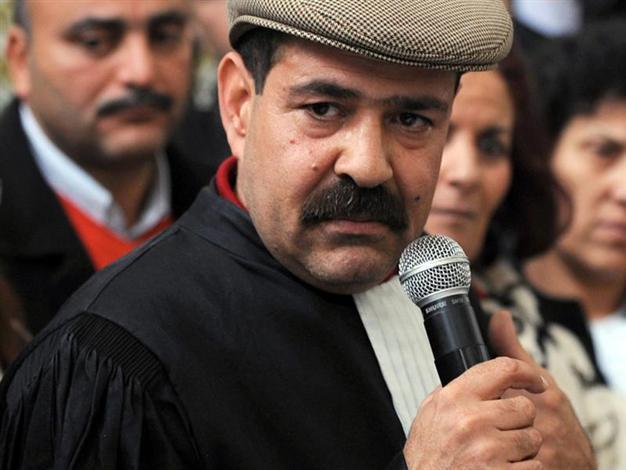Tunisian PM condemns opposition leader's killing as 'assassination of revolution'
TUNIS - Reuters

Tunisian lawyer and human rights activist Shoukri Belaid speaks at a meeting in Tunis along with other lawyers to express solidarity with the residents of Sidi Bouzid. AFP PHOTO/FETHI BELAID
A prominent Tunisian opposition politician was shot dead outside his home today in a killing the prime minister condemned as a political assassination and a strike against the "Arab Spring" revolution.
Prime Minister Hamadi Jebali said the identity of the killer of Shokri Belaid, a staunch secular opponent of the moderate Islamist-led government, was unknown.
President Moncef Marzouki cut short a visit to France and cancelled a visit to Egypt scheduled for tomorrow after the killing, which brought around 1,000 protesters onto the streets outside the Interior Ministry.
"The murder of Belaid is a political assassination and the assassination of the Tunisian revolution. By killing him they wanted to silence his voice," said Jebali, who heads the government led by the Ennahda party, which won Tunisia's first post-Arab Spring election in 2011.
Belaid, who died in hospital after being shot in the capital Tunis, was a leading member of the opposition Popular Front party.
"Shokri Belaid was killed today by four bullets to the head and chest. ... Doctors told us that he has died. This is a sad day for Tunisia," Ziad Lakhader, a leader of the Popular Front, told Reuters. Other party sources confirmed his death.
Tunisia, the first Arab country to oust its leader and hold free elections as uprisings spread around the region two years ago, has so far made a relatively smooth transition to democracy.
Ennahda won 42 percent of seats in the first post-Arab Spring elections in October 2011 and formed a government in coalition with two secular parties, Marzouki's Congress for the Republic and Ettakatol.
However, the government has faced many protests over economic hardship. Hampered by declining trade with the crisis-hit euro zone, it has struggled to deliver the better living standards that many Tunisians had hoped for.
And it says al-Qaeda-linked militants have been accumulating weapons with the aim of creating an Islamic state. Police, who demonstrated outside the prime minister's office last month, say they do not have the appropriate resources to deal with the threat from al-Qaeda in the Islamic Maghreb and domestic Islamist militants who have easy access to weapons from neighboring Libya.
The president was in France for a meeting of the European Parliament and was due to have gone to Egypt to attend an Islamic summit.
